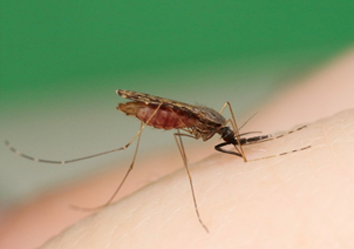
The discovery, published this week in Nature Communications, suggests Africa—where malaria will cause an estimated 400,000 deaths in 2015—is more at risk for drug-resistant malaria infections than previously thought and could further compromise efforts to prevent and eliminate the disease.
P. falciparum parasites resistant to artemisinin, the main drug used to treat malaria, have been rapidly spreading in parts of Southeast Asia, making it difficult to treat and control infections there.
Malaria experts are concerned artemisinin-resistant parasites could also arise in Africa, but until now there were no scientific indications to suggest that these parasites could infect Anopheles coluzzii (formerly Anopheles gambiae M form) mosquitoes, the species most frequently responsible for transmitting malaria in Africa.
To investigate the transmission potential of these parasites, scientists at the National Institute of Allergy and Infectious Diseases (NIAID), part of the National Institutes of Health, and their global partners, infected various mosquito species from Southeast Asia and Africa with artemisinin-resistant parasites from Cambodia in a laboratory setting. They discovered the parasites easily infected Southeast Asian mosquito carriers Anopheles dirus and Anopheles minimus, as well as Anopheles coluzzii.
In collaboration with the MalariaGEN P. falciparum Community Project, the scientists generated whole genome sequences of the P. falciparum parasites used to infect the mosquitoes. They discovered a shared genetic background among artemisinin-resistant parasites that may enable them to infect diverse mosquito species by evading their immune systems.
“To preserve the efficacy of artemisinin in Africa, we need to address a myriad of important questions about the biology of drug resistant parasites, the human hosts that they infect, and the mosquitoes that transmit them. This study answers one such question by showing that artemisinin-resistant strains from Southeast Asia can be carried by African mosquitoes,” said co-author Dr Olivo Miotto from the University of Oxford.
“This is clearly a sombre warning, but also a step towards understanding the genetic basis of transmission through different species of mosquitoes,” added Dr Miotto.
The ability of artemisinin-resistant parasites to infect diverse Anopheles species may help explain the wave of resistance that has occurred in Southeast Asia in recent years and poses challenges to preventing resistance in Africa, according to the authors.
The researchers plan to investigate other potential genetic determinants of parasite infection of mosquitoes and further examine which Anopheles species from Cambodia are naturally transmitting artemisinin-resistant parasites in the wild.
Publication details
St. Laurent B et al. Artemisinin-resistant Plasmodium falciparum clinical isolates can infect diverse mosquito vectors of Southeast Asia and Africa. Nat Commun. 2015 Oct 20;6:8614. doi: 10.1038/ncomms9614.

